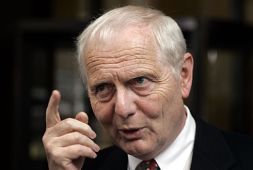UK, France, US press for faster progress in Darfur
May 11, 2007 (UNITED NATIONS) — The U.K., France and the U.S. are calling for faster progress in bolstering the beleaguered African Union peacekeeping force in Darfur and promoting a political settlement of the four-year conflict.

The three veto-wielding members of the Security Council are concerned that the calendar for action keeps moving forward rather than having key decisions take place now, he said.
The request for the meeting comes after Ban late last month had urged the U.S. and U.K. to hold off on their push to introduce a proposal calling for sanctions against Sudan if the country doesn’t agree to the U.N. force for Darfur.
Jones Parry said “there are lots of problems” about getting 3,000 U.N. troops, police and civilian personnel along with six attack helicopters and other equipment into Darfur to strengthen the 7,000-strong A.U. force, “and some of those problems relate to decisions yet to be taken in Sudan.”
“We’d like those to be taken so that camps can be built and troops actually moved, but there are a whole series of steps that need to be taken and which we want to see faster progress on,” he said.
Sudanese President Omar Al-Bashir agreed in November to a three-phase U.N. plan to strengthen the A.U. force. The first phase, a light support package including U.N. police advisers, civilian staff and additional resources and technical support, has already been sent to Darfur.
After five months of stalling, the Sudanese president recently gave the go-ahead for the second phase – the 3,000-strong “heavy support package” plus additional equipment, but Jones Parry complained that its deployment is being delayed.
Al-Bashir has refused to give a green light to the third and final phase – a 20,000-strong “hybrid” U.N.-A.U. force – saying he would only allow a larger African force with technical and logistical support from the United Nations.
The five permanent Security Council nations – the U.S., U.K., France, Russia and China – discussed Darfur late Thursday and how to speed up the political process and military deployment, China’s deputy U.N. ambassador, Liu Zhenmin said.
Liu said U.N. peacekeeping officials are just starting to talk to different troop contributing countries, and he said the council expects the U.N. “to speed up the deployment of the heavy support package,” possibly to this summer.
Jones Parry said the five permanent members agreed the timeline to deploy the heavy support package should be speeded up, “but we didn’t, of course, have any precise means by which we would advance it.”
While the United Nations and the African Union press for action on the military deployments, envoys for the two organizations have also been working to bring all rebel groups to the peace table to negotiate a settlement to the conflict that has killed more than 200,000 people and displaced 2.5 million.
A peace agreement signed a year ago year between al-Bashir’s government and one rebel group in Darfur has failed to stop four years of fighting because other rebel factions have called the deal insufficient.
U.N. envoy Jan Eliasson and A.U. envoy Salim Ahmed Salim told reporters in Khartoum on Thursday that they are hopeful current peace initiatives will succeed and backed an initiative of southern Sudanese leader Salva Kiir Mayardit, who is also Sudan’s first vice president, to hold negotiations with the Darfur movements to help unify their position.
Salim noted that the Khartoum government also supports Kiir’s initiative to convince holdout rebel movements to join the peace process.
Jones Parry said the three countries want to talk to Ban about the heavy support package, “where we are on the hybrid operations, what can we do to catalize – make faster – the political process, and generally to take stock.”
“There’s a range of problems including capabilities, and the military assets, and people, and funding,” he said. There’s a lot of things that need to be sorted out and every time … you raise one issue … you find it’s much more difficult than you had been led to believe and it’s much slower than you had expected,” he said.
The Darfur conflict began when members of Darfur’s ethnic African tribes rebelled against what they consider decades of neglect and discrimination by the Arab-dominated government in Khartoum. Sudanese leaders are accused of unleashing the pro-government Arab militia, the janjaweed, that has committed many of the conflict’s atrocities – a charge they deny.
(AP)
